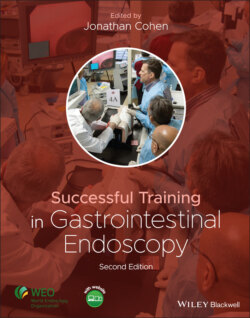Читать книгу Successful Training in Gastrointestinal Endoscopy - Группа авторов - Страница 120
Indication/contraindications
ОглавлениеAll trainees need a solid understanding as to when a colonoscopy should be performed, and perhaps more importantly when it should be avoided. One of the most common indications for a colonoscopy is as a screening exam for colorectal cancer. In the general population, these exams traditionally begin at the age of 50 years and if normal, every 10 years thereafter. In 2018, the American Cancer Society has recommended moving this initial screening to 45 years old, which may prompt other societies to follow suit. If a few small polyps are found on a screening exam, this surveillance interval is shortened to 3–5 years depending on the findings. Certain other indications, such as more numerous polyps, larger polyps, advanced dysplasia, villous architecture, or hereditary polyposis syndromes, can result in initiating early screening before the age of 50 or shorten the next interval even further to 1–3 years. In the case of particularly large or advanced polyps, a follow‐up examination in 3 months may be required to ensure complete resection of the lesion. Screening guidelines are frequently updated and every endoscopist must keep current with the most recent recommendations. These guidelines can typically be found online at professional society web sites such as the American Society for Gastrointestinal Endoscopy (ASGE), American College of Gastroenterology (ACG), or American Gastroenterology Association (AGA) [2, 3].
Other indications for colonoscopic examination are primarily symptom driven. Of these, suspicion for GI bleeding (iron‐deficiency anemia, positive stool occult blood tests, or even frank hematochezia) is likely the most common cause for lower endoscopy [4]. A change in bowel habits (stool caliber, constipation, or chronic diarrhea), suspicion of inflammatory bowel disease, abdominal pain, and abnormal radiographic imaging studies are all common indications to pursue colonoscopy as well. Other less common causes include foreign body removal, volvulus reduction, or decompression of colonic pseudo‐obstruction.
As stated earlier, there are times when it is not safe to proceed with colonoscopy. These include recent colon surgery, recent myocardial infarction (MI), the presence of severe colitis, supratherapeutic anticoagulation, or the presence of hemodynamic instability [4]. It is advised to delay colonoscopic exam for 3 months following colonic surgery, such as a new stoma or other colonic anastomosis. In the case of a recent MI, there are no specific guidelines regarding this. For elective procedures, one should wait until well after the event and base timing on the patient's clinical status. Emergent colonoscopy for gastrointestinal bleeding following an MI has been studied. Though there is roughly a ninefold increase in complications (9% vs. 1%), these complications are usually minor and generally the patients benefit more from the timely intervention of bleeding [5]. These are all relative contraindications and earlier exams can be performed if clinically required. In “severe” colitis (as can be associated with infections, Crohn's, ulcerative colitis, or ischemic colitis), it is generally advised to reduce the colonic inflammation before proceeding with endoscopy; however, limited exams can be indicated if the cause of colitis is unclear or to monitor the response to therapy. Mild to moderate colitis typically do not pose a contraindication to colonoscopy. For patients on anticoagulation therapy (such as warfarin, clopidogrel, or aspirin), institutions vary with the level of acceptable risk, but in general, low‐risk diagnostic exams can likely be safely performed on some level of therapeutic‐range anticoagulation [6]. Therapeutic measures (such as biopsy or polypectomy) may require lower anticoagulation thresholds or even discontinuation of therapy prior to colonoscopy for safety reasons. Endoscopy should be delayed if levels of anticoagulation are supratherapeutic. Trainees should read and remain current on published guidelines on the practice of endoscopy for patients taking anticoagulation medications, which are available online at www.asge.org.
